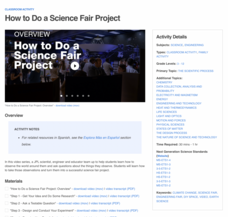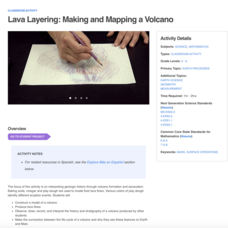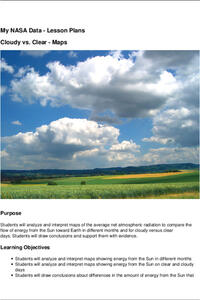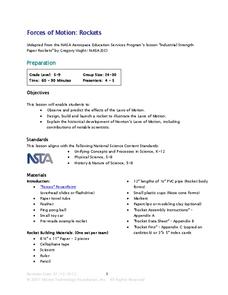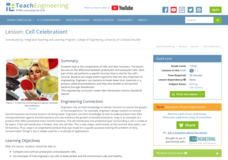NASA
Water Filtration Challenge
Can the class think like the scientists on the International Space Station? Engineers design, test, collect data, and improve a water filtration device similar to a system found on the ISS. Participants use pH strips, optional...
NASA
How to Do a Science Fair Project
Build problem-solving skills with science! Step-by-step videos walk investigators through each stage of completing a science fair project. Scientists learn to formulate a testable question, design an experiment, collect data, draw...
NASA
Exploring Exoplanets with Kepler
Calculate the movement and properties of planets like professional astronomers! Scholars use Kepler's third law to find Mercury and Venus's distance from the sun. Using changes in brightness of distant stars and Kepler's third law,...
NASA
Lava Layering: Making and Mapping a Volcano
Looking for an out-of-this-world volcanic activity? Geologists study Earth's volcanic history and the neighboring planet Mars by modeling volcanic eruptions, lava flows, and building a shield volcano. Participants use graph paper and...
NASA
Analyzing Surface Air Temperatures by Latitude: Student Activity
Explore global temperatures from the comfort of your learning place! Meteorologists analyze surface temperatures and anomalies across different latitudes. Investigators evaluate graphs to find temperature differences and answer questions...
NASA
Seasonal Science: Building Claims from Evidence
A lot can change in a year! Investigators observe a video of Earth over the course of a year and complete a KWL chart. Astronomers view a second video, participate in a guided discussion, and discuss the rubric for successfully...
NASA
Cloudy vs. Clear - Maps
Find out the science of how clouds keep Earth cooler on hot days. Using guided discussions, investigators analyze and interpret maps of how much solar energy Earth receives at different times of the year. Participants draw conclusions...
NASA
Soda Straw Rockets
Three, two, one, blast off to a better understanding of force and motion with this exciting science lesson! Beginning with a discussion about rockets and gravity, young scientists go on to complete a series of worksheets about net forces...
Micron Technology Foundation
Forces of Motion: Rockets
Young scientists design a rocket to launch using Newton's Laws of Motion in order to discover for themselves the forces of motion.
National Wildlife Federation
Green Green Revolution
School budgets don't have a lot of extra money, so when students propose saving the district money, everyone jumps on board. The first lesson in the series of 21 introduces the concept of an energy audit. Scholars form an eco-action team...
Science 4 Inquiry
Deforestation
Young scientists observe deforestation from satellite photos and discuss the importance of forests to the global environment. They then simulate a plot of forest when farmers move into the area over the course of seven years. Finally,...
American Museum of Natural History
Planetary Mysteries
Get to know our little part of the vast universe. Learners read about the common and not-so-common facts about each of the planets in the solar system. The interactive lesson includes a large amount of information as well as a quiz to...
Messenger Education
Mission: Possible—How Can We Plan an Exploration of Another World?
An astronaut's spacesuit weighs 280 pounds and takes 45 minutes to put on — that's a serious suit! The second activity of a three-part series allows pupils to see all that goes into space exploration. Through simulations, groups analyze...
Lawrence Hall of Science
DIY Sun Science
Get an up-close-and personal look at the sun from the safety of your classroom with this fun science application. Offering numerous activities, images, and videos, the resource supports children of all ages as they learn about the sun.
NOAA
Technology I
Isn't technology great? The 12th installment of a 23-part NOAA Enrichment in Marine sciences and Oceanography (NEMO) program introduces technology that marine scientists use. Pupils take part in an activity using conductivity,...
Teach Engineering
Come On Over Rover
Introduce your class to the steps that occur in the manufacturing of parts, the assembly, and the testing of a Mars rover. Pupils learn about fabrication techniques and tolerances in the manufacturing process.
Annenberg Foundation
Reading Maps
Can you read a map? Scholars use an interactive technology tool to analyze maps of various kinds to gather evidence and data to better understand their meanings and usefulness. Using newly obtained knowledge, they form an interpretation...
Teach Engineering
Airplane Tails and Wings: Are You in Control?
Keep everything under control. The instructional activity, the 16th segment in a 22-part unit, provides a more detailed look at the parts of a plane, specifically the control surfaces. Pupils learn about the construction of the wings and...
Teach Engineering
Manned Mission to Mars
To go or to not to go — the question for a mission to Mars. This resource provides details for a possible manned mission to Mars. Details include a launch schedule, what life would be like on the surface, and how the astronauts would...
Teach Engineering
Stormy Skies
Young meteorologists examine the four main types of weather fronts and how they appear on a weather map. Participants learn about the difference between the types of weather fronts along with their distinguishing features. A...
Teach Engineering
Cell Celebration!
Are you eukaryotic? (Answer: Yes.) The first of six installments in the Cells units teaches pupils about the similarities and differences of prokaryotes and eukaryotes. It also covers the functions of various cell components in both...
Teach Engineering
Energy Efficiency
Using the resource is probably the most efficient way to learn about efficiency. The 18th installment of a 25-part Energy Systems and Solutions unit has pupils investigate energy efficiency through discussions and associated activities....
Association of American Geographers
Project GeoSTART
Investigate the fascinating, yet terrifying phenomenon of hurricanes from the safety of your classroom using this earth science unit. Focusing on developing young scientists' spacial thinking skills, these lessons engage learners in...
Teach Engineering
Mechanics of Elastic Solids
Make the connection between Hooke's law and elasticity with an activity that introduces the class to the behavior of elastic materials. The resource defines stress and strain to calculate the modules of elasticity of materials and also...
Other popular searches
- Nasal Passages
- About Nasa
- Nasa Planets
- Nasa Robots
- Nasa Lesson Math
- Nasa Aircraft
- Nasa Materials
- History of Nasa
- Nasa Lesson Plans
- Nasa Web Based Textbook
- Nasa Aurora
- Contributions of Nasa



